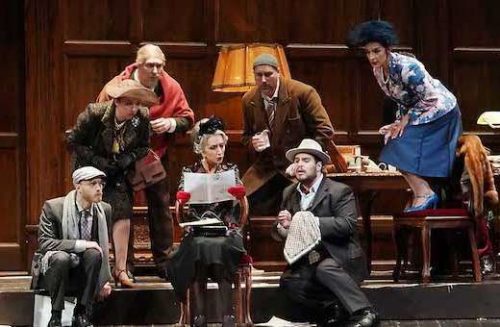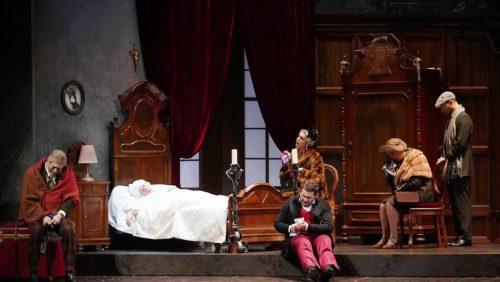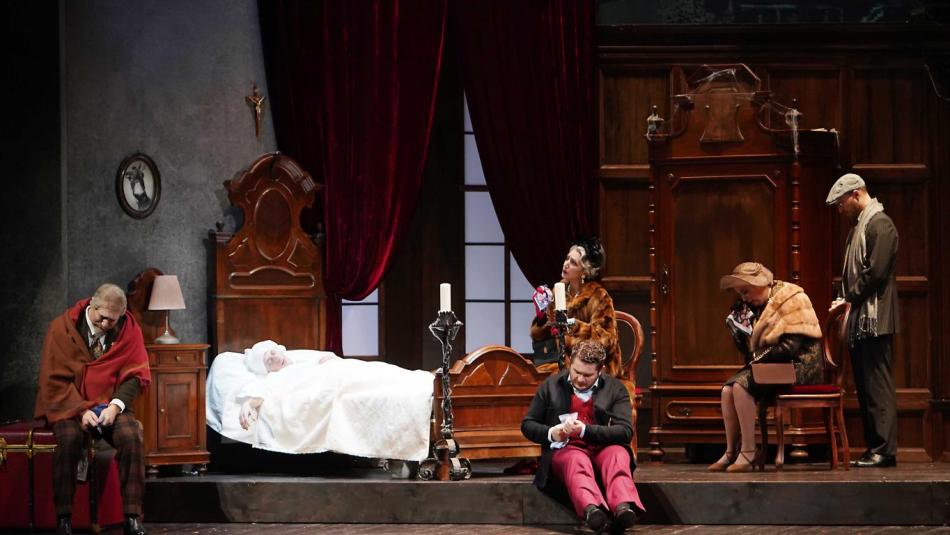 Italy Puccini, Gianni Schicchi: Soloists, Orchestra Filarmonica Italiana / Massimiliano Stefanelli (conductor). Performed at Teatro Municipale, Piacenza, Italy, and livestreamed (directed by Fabio Dolci) on 22.1.2021 and available to view on YouTube. (CC)
Italy Puccini, Gianni Schicchi: Soloists, Orchestra Filarmonica Italiana / Massimiliano Stefanelli (conductor). Performed at Teatro Municipale, Piacenza, Italy, and livestreamed (directed by Fabio Dolci) on 22.1.2021 and available to view on YouTube. (CC)

Production:
Director – Renato Bonajuto
Set – Danilo Coppola
Costumes– Artemio Cabassi:
Lighting – Michele Cremona
Assistant Director – Teresa Gargano
Cast:
Gianni Schicchi – Roberto de Candia
Lauretta – Giuliana Gianfaldoni
Zita – Valeria Tornatore
Rinuccio – Matteo Desole
Gherardo – Andrea Gallo
Nella – Renata Campanella
Betto di Signa – Graziano Dallavalle
Simone – Mattia Denti
Marco – Juliusz Loranzi
La Ciesca – Stefania Ferrari
Maestro Spinelloccio – Valentino Salvini
Ser Amantio di Nicolao – Simone Tansini
Pinellino Calolaio – Francesco Cascione
Guccio Tuntore – Lorenzo Sivelli
Gherardino – Elettra Secondi
Buoso Donati – Michele Zaccaria
The age of the silent bow is one that many of us find hard to adjust to; but ours is also the age of resilience and an affirmation of the power of music to unite and to give hope, even to heal. The idyllic Elysian Greek scene projected at back of stage seems to offer escape from the world’s present concerns, a Golden Age a kazillion miles away.
This Gianni Schicchi is unique in including an homage to Dante as a sort of preface: Gianni Schicchi in Dante’s Inferno (Schicchi appears in Canto XIII with a lady by the name of Myrrha), narrated by Mino Manni. Reproducing the subtitles here would not do the text justice, alas; suffice it to say that much poetry was lost in the journey from spoken Italian to English subtitles. Though certainly – both in delivery and indeed visually – there is much to enjoy with a touch of Grand Guignol about Danilo Coppola’s editing (he is also responsible for the sets) and Manni reminding me of an Italian Vincent Price.
Of course, the action all takes place in the same space, here a darkened room suitable for a dying man; costumes, too, are darkish (although Schicchi wears an orange shirt and long red scarf – could this be a Luciano Pavarotti reference despite the different voice range?).
Puccini’s Gianni Schicchi normally has bedfellows, most often the other parts of Il trittico of course; but the Opera Holland Park coupling with Mascagni’s Zanetto (another Florentine opera) in 2012 was unforgettable. Here in Piacenza, it stood alone; better to appreciate its strengths. Puccini’s writing can be light as a feather; and, despite the occasional big number, this is very much an ensemble opera, and as such played to Piacenza’s strengths.

As so often with the opera streaming performances, some of the orchestral playing can be approximate (in this case the strings in particular) but the spirit is always intact. This being Puccini’s rare foray into comedy, it depends on split-second reactions in both pit and onstage. Vocally, too, the cast is somewhat uneven. And while Roberto de Candia’s Schicchi is a confident accomplished one, and Giuliana Gianfaldoni is a fresh-voiced, beautiful Lauretta offering a pure, emotionally powerful ‘O mio babbino caro’, it is nice to see one of the other characters shine, too. In this case one in particular, that of Nella, sung with fabulous precision as well as huge character by soprano Renata Campanella (she has had a busy January 2021, singing the title role of Tosca at Teatro di Varese; she has previously sung Anna in Nabucco at the Ravenna Festival). The Rinuccio is Matteo Desole, particularly pertinent to UK readers as he was due to sing the Duke of Mantua in Verdi’s Rigoletto at Opera Holland Park last year (similarly, the run of Rigoletto at the Stadttheater, Klagenfurt that would have featured him in that same role in March to May of this year is also cancelled). He is a strong, ardent tenor with an attractive voice. Together, at ‘Addio, speranza bella,’ the two voices work perfectly together.
The opera is very finely conducted. Massimiliano Stefanelli paces it beautifully, the fast passages just fast enough to stretch the singers but still to retain intelligibility; dramatic and mock-dramatic moments are finely drawn, and he finds real tenderness from his orchestra, too (the closing pages of that ‘O mio babbino caro’ a case in point). He also brings out Puccini’s advanced scoring at ‘Addio, Firenze, addio cielo divino!’, as a result Puccini’s music emerges as a variegated, multifaceted jewel in Stefanelli’s hands.
All in all, an entertaining hour’s music and drama; a reminder, too, of Puccini’s genius.
Colin Clarke
To see this on YouTube click here.
